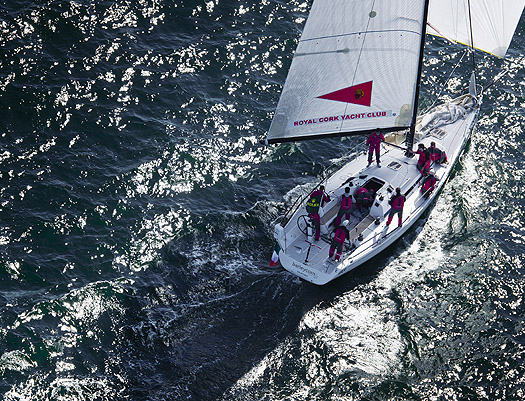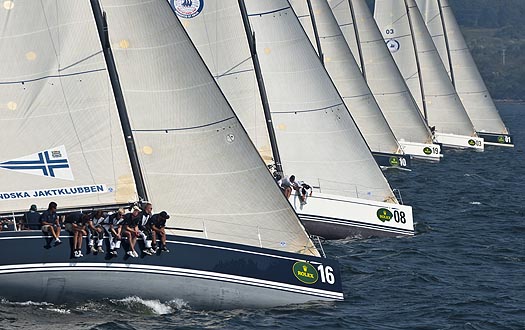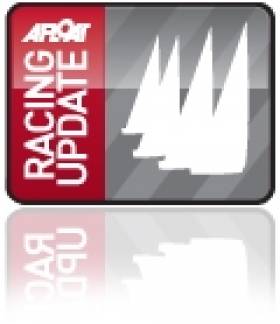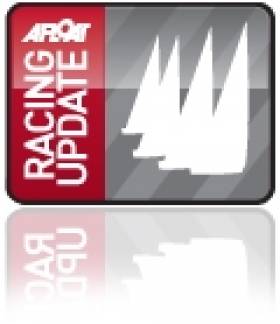Displaying items by tag: invitational
Royal Cork Move up to Seventh in New York
Royal Cork Yacht Club is seventh overall after scoring an impressive third place in yesterday's race nine of the New York Invitational Cup. The Anthony O'Leary skippered yacht moved from tenth to seventh after scores of 3 and 12 in the penultimate day of the competition yesterday. The Crosshaven crew is five points behind sixth place Japan, a team that have consistently held an advantage over the Irish crew this week.
The New York Chamber of Commerce could not have arranged a more spectacular day for the 22 competing yacht club teams, representing 16 nations from six continents, than what was delivered today after a cold front that passed through the area overnight left behind a classic New England fall day to tantalize competitors at the 2011 New York Yacht Club Invitational Cup presented by Rolex. And after sailing eight races over three days on courses set north of Newport's Pell Bridge, with the breeze from the north-northwest, and an ebb tide, the race committee made the decision to send the competitors out of the now-familiar Narragansett Bay to Rhode Island Sound for two races on the penultimate day of the series.

Royal Cork YC's entry in the New York Cup skippered by Anthony O'Leary with tactics from son Nicholas Photo: Rolex/Kurt Arrigo
Remarkably, the first race of the day saw yet another yacht club team winning a race. Eastern Yacht Club became the ninth race winner, in nine races, when they took over the lead early in the race and held it all the way to the finish line.
"It was a good one," said Bill Lynn, helm of the Eastern Yacht Club team of the race as he explained that the EYC sailors liked the conditions today. "I think we're fast , but I don't think we're the fastest boat here, so I think getting out into some shifty, variable breeze with not perfectly flat water, suits our style in these boats a little better. We finally got a great start, which is kind of nice. It was probably our best start of the series so far, and then we just were patient. When we came off the windward end [of the starting line] and tacked onto port there were an awful lot of boats on port way up inside us. It looked grim there for a while. But we were going to stick to our guns and wait it out. And we did, and the righty finally came in at the end and got us around the mark in third and then after that it was playing the shifts [to stay at the top]."
When Lynn's team got through the first gate, they split with the Royal Yacht Squadron. "Fortunately we sent them around the wrong gate and we went around the right gate. When the breeze shifted back left we were crossing them. After we went through the gate and started going back upwind it got super windy, our gage was showing low 20s, and it stayed that way for the rest of the race. When it [the breeze] came smoking back in half-way through, that wasn't in anybody's forecast."
Lynn went on to explain that in a northwest breeze, you have to sail your own race and not worry too much about the other boats. "You almost have to pretend there are no other boats on the course. It's not about winning every race in a northwester, its about not blowing one." For race two, Lynn characterized Eastern's start as good, but in the wrong place on the line. They would go on to finish sixth, and now have 82 points on the scoreboard to stand fifth overall, while tied on points with Newport Harbor Yacht Club which is currently fourth.
For the second day in a row, the final race of the day has been won by the Clube Naval de Cascais (CNC) from Portugal, making them the first team in the 10 races to repeat as a winner. At the helm of CNC is Patrick Monteiro de Barros, whose varied sailing resume includes representing his country at the Olympic Games (twice), as well as circumnavigating the globe (twice). CNC placed 21st in the earlier race today, and with 128 points lies 16th overall.
It would certainly seem that the artic air from home brought additional good fortune for Royal Canadian Yacht Club (RCYC), as they maintained their grip on the top-position in the overall standings. With finishes of 6-11 today, they not only have 46 points but also have increased the spread to 10 points over New York Yacht Club which has 56.
Annapolis Yacht Club has moved up to third overall on 68 points after finishing 4-2 today. Tactician John Torgerson compared the flukey conditions the AYC team is used to in Annapolis with what they saw today on Rhode Island Sound. "It was super-shifty for a while and we like that," said Torgerson. "We had a good idea of what we were going to do off the start and we executed it. For the first race it was light at the start. We saw as little as nine [knots] to as much as 22, it was a huge range. You just had to be able to shift gears. We have guys that are really good at figuring it out." AYC's strategy for the final day of racing is to "just go out and sail" and hope that the two teams above and below them take each other out.
The eleventh and final race of the series will be held tomorrow, Saturday, September 17, and is scheduled for 1100. It will be preceded by the fleet parading through Newport harbor at 0900, with competitors leaving NYYC's Harbour Court at approximately 0830. The winner of the 2011 New York Yacht Club Invitational Cup presented by Rolex will be confirmed at the conclusion of racing.
Royal Cork Crew Moves up to Sixth at New York Yacht Club Invitational
Ireland's Royal Cork Yacht Club moved up two places overall in the Rolex New York Invitational Cup yesterday after scoring 3,10 and 11 in the 22 boat fleet yesterday. The Anthony O'Leary skppered boat is just three points behind Japan who ties for fourth place after six races with the Newport harbour team on 48 points. Third place is Annapolis Yacht Club on 43 points.
Returning to upper Narragansett Bay for the second day of the fixture has proven beneficial for at least one of the 22 yacht club teams – Royal Canadian Yacht Club – which again displayed remarkable consistency on the race course. And in a repeat of yesterday's prevailing theme of tight competition, today's three races were won by three different clubs which means that there have been no duplicate winners thus far in the six-race series.

A keen start yesterday. Royal Cork is bow number three. Photo:Dan Nerney/Rolex
"We were probably the biggest movers," said Peter McChesney, helm for the Annapolis Yacht Club team who has only sailed in Newport a handful of times previously, including the the New York Yacht Club Invitational Cup U.S. Qualifying Series in 2010 in which the AYC team finished second to earn the opportunity to race in this event. AYC was 10th overall after yesterday's first day of racing, and moved up to third overall with 43 points after finishes of 6-1-3 today. "We just got off the line better today in every race, and gave our tactician [John Torgerson] the opportunity to make good decisions. If you get a good start it's easier to make those decisions. Our tactician took what we gave him and did a great job of calling tactics, and the crew work was essentially flawless. Everything just went our way."
The exciting conditions seen today on Narragansett Bay have also proven why Newport remains such a unique place to sail. "Where else can you sail in 20 knots of breeze and have the seas be this flat?," said Chip Whipple, timmer on the New York Yacht Club team. "It really is an anomaly. When you have as much breeze as this [in the Med] you're sailing in big seas and a lot of swell. And in northern Europe you have the cold water and big seas, breaking waves. Being as protected as we are here it's just an extremely fantastic place to sail, and the boats can't sail any faster because they are absolutely optimized for the conditions."
The Royal Canadian Yacht Club (RCYC) team has retained the overall lead position after adding finishes of 2-4-2 to yesterday's finishes of 2-1-4 for 15 points. When they won the second race on the first day of the contest, they were given the Rolex gold spinnaker to fly in the subsequent race. And, as overall standings leader, RCYC carried the golden chute for all of today's races, and will continue that way when racing resumes tomorrow.
"We had to bail on two starts," said RCYC helm Terry McLaughlin after racing today, explaining that the RCYC team was forced to tack in both instances but the moves wound up working in their favor. "It was good breeze most of the day and we were going well. We're trying to do all the fundamentals well and not make mistakes." With eleven races planned, and tough competition, McLaughlin knows all to well that the 13-point lead RCYC currently enjoys can disappear in a hurry. "We had a good battle with NYYC in the last race, caught up to them on the last leg. It was close, but they beat us by three boat lengths."
"The last race was a lot of fun," said Ken Colburn, skipper of the New York Yacht Club team when summing up their win of the final race of the day. NYYC now stands second overall with 28 points, 13 points behind RCYC. "We had a great start, found ourselves in a clean lane and just were able to get in the proper groove. RCYC was there every inch of the race. We stayed together . . . gapped the fleet . . . for both of us it was just a fabulous race." Emphasizing that there was still a lot of racing to come, Colburn noted that, as anticipated, the quality and depth of the competition is remarkable. "Six winners in six races is indicative of how strong this fleet is overall."
Racing resumes today Thursday, September 15, with the warning signal for the first race scheduled for 1100. Competitors leave NYYC's Harbour Court for the race course at approximately 0930 each morning. The winner of the 2011 New York Yacht Club Invitational Cup presented by Rolex will be confirmed at the conclusion of racing on Saturday, September 17.

























































